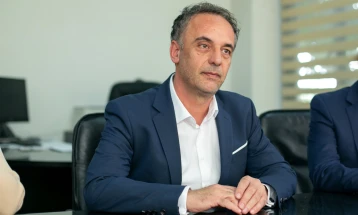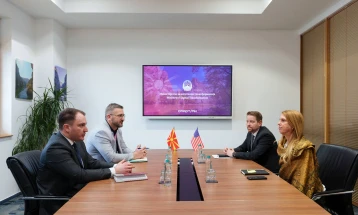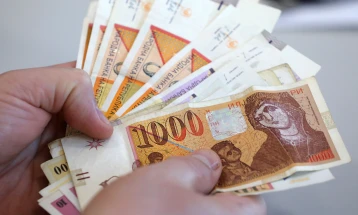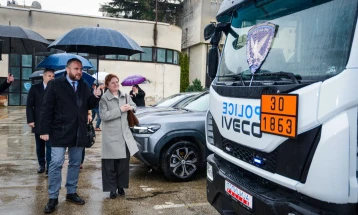Annual Parliament address of President Stevo Pendarovski
- Full text of the annual Parliament address of President Stevo Pendarovski
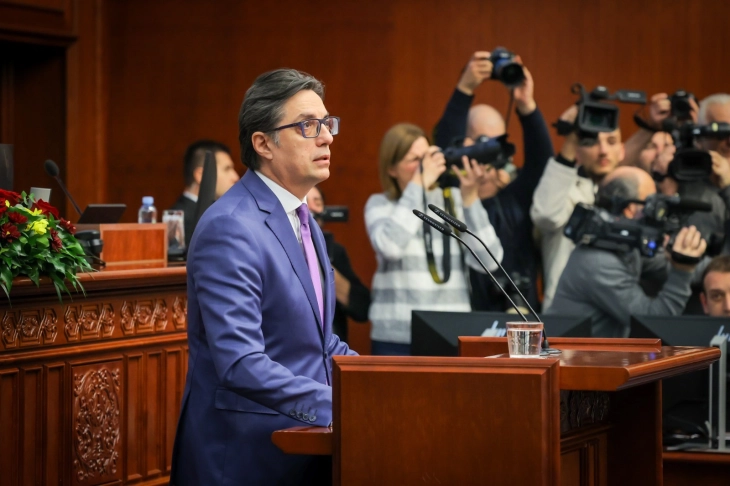
19 December 2023
Full text of the annual Parliament address of President Stevo Pendarovski
Respected citizens, distinguished President of the Assembly,
Honorable Prime Minister, Honorable Members of Parliament,
Respected ministers, esteemed guests,
Your excellences, representatives of the media,
Let me say that it is a special honor for me today to be in the home of legislature for the fifth time to address the Macedonian public for the last time in this term as Head of State. This building bears witness to the entire history of the modern Macedonian state, to all its sublime, but also tragic moments, from its beginnings as Democratic Federal Macedonia after the war, until today.
All the events that have happened here, whether pleasant or not and bloody like April 27, 2017, are part of our common history from which, I hope, we have all learned valuable historical lessons together, so that we know, as Misirkov said, “what should we do in advance?”.
However, the most relevant period, in a historical perspective, happened, in this place, at the outset of our independence, when the foundations of the state were laid, which was the main motive for awarding all the deputies in the first parliamentary composition with the order of September 8.
Honorable Members of Parliament,
On May 12, 2019, in my first speech in this Assembly, as head of state I said that the energy and potential of society must be united around several strategic issues: the Euro-Atlantic aspirations for which there is rhetorical agreement between the relevant political subjects, although we differ drastically in the modalities for their attainment. Then, the balance in inter-ethnic relations, which has always been an axiom for internal stability and security, and, regarding the top priorities on which our future depends, I said that these are, first, achieving much higher rates of economic development than before, and second, zero tolerance for crime, corruption and nepotism.
The question that logically arises is: where were we then, and where are we today, after five years?
On March 20, 2020, I signed the North Atlantic Treaty Organization Accession Instrument, and a week later we became a full-fledged member of the largest military-political organization in the world. With that, we rounded off the commitments of several parliamentary assemblies and governments and materialized the support that the vast majority of Macedonian citizens is continuously providing.
Membership in NATO is not a guarantee that we will no longer face security threats and challenges, as every country in the world faces them. However, membership is a guarantee that we no longer deal with the challenges alone as there are 30 countries with us, 30 democracies, 30 powerful armies, 30 of our friends, both in good and bad.
Although it was a non-military threat, the COVID-19 pandemic which caused a collective trauma to the nation with close to 10,000 deaths confirmed the high performance of the Alliance which provided its members with protective medical equipment in the first month after its outbreak. However, the real test of Europe’s post-war security architecture, where NATO is the mainstay, came with the brutal Russian invasion of Ukraine.
We are among the top 5 member states of the Alliance according to the ratio of the gross domestic product and the military and material-technical assistance that we give to Ukraine during this critical period. Some quite legitimately ask the question: Why we implement such a policy. The formal answer would be: we do so because we are a member of NATO, where the principle of solidarity applies, and because we believe in the Charter of the United Nations, which does not allow military aggression by one of its member states against another.
But the essential and real answer would be: because throughout history we have suffered from the larger nations around us, which in some historical periods implemented destructive strategies towards the Macedonian people, ranging from our identity disfigurement, up to our physical elimination.
In this security context, let me briefly refer to the most current world conflict at the moment, between Israel and Hamas, which we, as a small country, certainly cannot influence, but can feel the negative effects of that bloody conflict.
Our political position is clear and we demonstrate it in all the votes so far in the United Nations. The first element of that position is that Hamas is a terrorist organization, and I believe that the time has come for us as a state to confirm this with a formal decision. Second, according to all international acts, Israel has the right to self-defense, but, third, according to those same international documents, it must take care not of the terrorists of Hamas, but of the human rights of the Palestinians. In that sense, the Israeli army must employ a proportionate use of lethal force, and protect the lives of civilians, women and children.
What is most important from the point of view of our national interests, careful and responsible behavior of all political subjects is needed so that this conflict does not deepen the divisions in our multiethnic, but also multi-religious society. Unfortunately, the initial effects of such hate speech are already perceptible on our social networks.
Ladies and gentlemen,
The latest decisions of the European Council, unfortunately, confirmed the pessimistic scenario for the Western Balkans, which some diplomatic circles have been announcing since the beginning of the war in Ukraine. It is indisputable that we did not do our homework in terms of the undertaken obligations, but it is difficult to find logic in the latest decisions of Brussels, which practically completely bypassed the region, which will certainly further contribute to the decline of the attractiveness of the project called United Europe. The statement that it will be a geopolitical disaster if Ukraine and Moldova get priority in relation to the Balkans is not mine, nor of any Macedonian politician, but of the Austrian Minister of Foreign Affairs, which contains all our frustrations and betrayed hope.
However, the country must remain on the European integration path, regardless of which executive power will be in charge after the elections in May 2024 and what will be the movements after the elections for the European Parliament and the presidential elections in the United States. The possible slowing down, even more so, the complete halting of European integrations will not reflect well on any sphere of social life, starting from the economy, ending with inter-ethnic relations. Enthusiasm among citizens for membership in the Union is dropping dramatically; we are at a critical point and this is the last chance to preserve the majority support for negotiations which always have a neutralizing effect against the structures that want to undermine democracy.
Regarding the constitutional changes, the future parliamentary composition will have to continue the debate on real grounds and with a far more virtuous attitude towards the Macedonian public. It is crystal clear that the European framework cannot be changed for the better, nor can the bilateral agreement with Bulgaria, regardless of who is in power in Brussels or Sofia.
Allow me, for a moment, to be deeply personal about this issue and recall the now distant 2008, when at the NATO Summit in Bucharest, as a member of the Macedonian delegation, I directly witnessed the missed historic opportunity, due to national disunity and petty party calculations.
10 years later, we accepted a much worse proposal, and, in total, we lost 12 years out of the Alliance. I do not believe that history repeats itself in identical cycles, however, there are similarities in the domestic political environment, with some thinking, as then, that Europe and the world will be waiting for us. Of course, it is politically quite legitimate to be against the European negotiating framework, but politically it is also virtuous to admit that there is a huge difference between what the Bulgarians demanded of us at the beginning, and what of those demands remained in the document.
Though we have debated this issue many times before, I will use this opportunity to repeat it once again, mostly because of the fears of the Macedonian people who are bombed with political propaganda every day. I am deeply convinced that none of today’s generation of politicians will ever negotiate identity issues, because our red lines were not determined by us, they were determined long ago by those who created this country in 1944 with the state-founding acts of the First Session of ASNOM.
Did the governments of Bulgaria in recent years, completely unnecessarily, make a series of bad moves towards the Macedonian people – yes, they made, is the trust of the Macedonians towards the eastern neighbor largely shaken and will it take years, maybe even generations to restore it – yes, that is indisputable, but it is certainly not in our strategic interest to make an enemy out of Bulgaria, because it is in our interest to have a stable environment and productive cooperation with all our neighbors, instead of wasting energy on them, arguing about history.
By postponing the constitutional changes, we will miss another opportunity that may leave us at least another decade outside of integrations, which will mean less economic progress, worse standards for citizens and greater emigration. In that decade, we will certainly not return the young people from Canada, Australia and New Zealand, nor from the new destinations of emigrant Macedonia - Emirates, Malta, Croatia or Slovenia.
The divisions in the Macedonian national tissue on this issue are counterproductive to the vitality of our cause. In that sense, the renewed foreign propaganda has been doing its job “excellently”, practically without interruption, for more than a century, so there is no need for us to dig further to deepen the gap between us.
Moreover, it is extremely irresponsible to play with the feelings of Macedonians and score petty political points on the topic of fear of the alleged loss of identity attributes. I have said this many times before, but I have to repeat it: if the theft of identity of the Macedonian is the path we have to take to reach the Union, I know no one who is ready to walk that path.
In the public space, on social networks, real wars have been fought in recent years about who is a greater patriot or traitor. It is high time to redefine patriotism, which, in a modern form, individually and collectively, should be based on the integrity of the person and the loyalty to the state.
Patriotism is when you do not abuse the office for personal enrichment, when qualified persons are there to lead the institutions. Patriotism is when you leave room for your political opponents to express their opinion freely, when you show a chivalrous attitude towards those you disagree with, patriots are those who work for better public services, better education and health, patriots do not pollute the environment.
Ladies and gentlemen,
For years, we have been facing resistance from several sides during every attempt at substantial reforms in the justice system. The reason for that is the connection between parts of the political and business community with some of the judges and prosecutors, which in the past decades created an atmosphere in which we have developed endemic corruption that threatens the vitality of the state.
In the medium and long term, the quality of human potential, of candidates for judges and prosecutors, is crucial. No law can change the reality if the only criterion for selection is negative selection based on party clientelism and ties to the oligarchy.
When I say responsibility for the committed acts, I do not mean the statistics of convicted “pickpockets” that serve to mislead the public, but the number and quality of final verdicts in the sphere of high corruption and organized crime. Only in this way will it be confirmed that the laws apply to everyone, even the most powerful and the richest.
Unfortunately, one gets the impression that the US and the European Union are more zealous fighters against corruption in our country than our institutions. However, foreign sanctions are not enough, not least because they are not followed by domestic sanctions. Namely, we are facing a much deeper problem, because corruption, in the meantime, has become a way of life for many, or as a foreign ambassador recently described it, it is a question of people’s mentality that must be changed. At the same time, two aspects of the problem further emphasize its proportions.
First, if initiated at all, the processes of high corruption are extremely slow and uncertain, which reinforces the perception among citizens that justice is slow, and yet unattainable.
Second, even the few successfully completed court trials are limited to a specific period of time, and there is almost always a lack of continuity in the state’s actions, especially after changes in government at the central or local level. Such vacuum periods practically nullify the effects of the rare successful cases of corruption against public office holders.
Here, my message for the next parliament composition is what I have already publicly proposed several times: immediately after the elections, a purge of both judges and prosecutors is necessary, but, first of all, of us - the politicians. And for anyone, for whom there is no logical explanation as to how he became a millionaire with a state salary, not only resignation, but criminal proceedings should immediately follow.
Distinguished MPs,
When we finally found political will to count the population in 2021, I said the results would confront us with our worst fears. In doing so, I did not refer to fear of others, different from us, but fear of how few of us there actually are in our country. The results confirmed what I have been saying for years that the biggest threat to our national security and, in general, to the future of North Macedonia is demography.
Namely, the reality is that all ethnic communities are fewer in absolute numbers and that no ethnic community “threatens” another, but that we are all threatened. That is why we urgently need a demographic strategy, supported by the government and the opposition, which will be based on the data from this census, but also on the projections for the demographic development until 2070, which were published by the State Statistics Office a few days ago.
That strategy, in principle, should consist of 2 elements. The first element consists of active demographic policies that will stimulate birth-rate.
The second is facing the real situation. This means that we should be aware that active demographic policies would give results after ten, or, more likely, after twenty years. Until then, we have to prepare for life with few students and employees, and many pensioners. This means preparing the pension system, optimizing health care, reorganizing the education system, starting an intensive digitization that would replace people where possible, and, last but not least, reorganizing the security system in conditions when the number of new soldiers and policemen starts to decrease.
Ladies and gentlemen,
After our elections next year, regardless of what the Macedonian citizens will decide, two things are crucial for the country: maintaining stable inter-ethnic relations and the western orientation in foreign policy, that is, continuation of the integration in the EU.
Next year in Brussels and in Washington, our key strategic partners, election cycles will be held on the outcome of which many things will depend. The growth of populism in Europe is not new, but, as never before, populist forces are gaining political weight and influence in the processes that are affecting our country. All this is happening against the backdrop of the war in Ukraine, the conflict in the Middle East and the geostrategic competition between the two key factors in international relations. Predictions are that these trends will not change significantly even in 2024.
Russia’s aggression against Ukraine has disrupted the world’s food and energy markets, but above all the security infrastructure in Europe created after the fall of communism. Although the Western Balkans is apparently far enough from that part of the world, it cannot be ruled out that in a certain context an increase in tensions is also possible in our region in which there are Ukrainian refugees, Russian citizens and companies formed by them, an increased intensity of cyber-attacks, and the old, fragile points in the region also have their potential: the north of the Republic of Kosovo and the Republika Srpska entity in Bosnia and Herzegovina, where the international missions in which we participate have a key stabilizing role.
Our priority should be through a constant political dialogue between the government and the opposition to increase the internal potential for reaching consensus on important national issues, and in that segment this year a kind of paradox happened: in March, the international community, believing in our capacities, entrusted us with the organization of the Belgrade-Pristina dialogue, and, at the same time, without the assistance of that same international community, through the Jean Monnet dialogue, we would not have managed to harmonize the new Rules of Procedure of the Assembly.
Dear Members of the Parliament,
The end of 2023 brought us the greatest sadness in the last decade. Through the personal tragedy of young Vanja and her family, we could see clearly the entire pathology of the Macedonian transition, the environment that all of us, more or less, created in the past 32 years. An environment in which, in the public space, we tolerated non-humans who propagated inter-ethnic hatred and intolerance, aggressive ideologies, hate speech, publicly made threats to lynch individuals and liquidate political opponents.
Each of us, and especially the politicians, should speak much more often and louder against these phenomena, instead of believing in the power of our democratic system that it will be able to tolerate and absorb such extremes. Unfortunately, the entire social system also failed because, in the name of some misunderstood democratic pluralism, it did not prevent these individuals from further polluting the public space.
The mechanisms of the legal state simply must in time sanction all those who use hate speech against political opponents, insult or threaten people of another faith or nation, political parties and non-governmental organizations that work contrary to what is declared in the founding documents and, in essence, abuse democracy as indisputable value of the modern world.
In other words, the state must systematically and timely marginalize those who propagate anti-civilization values in order to prevent some future killers who, apart from our citizens, children, adults or the elderly, can kill our collective dirty conscience again.
Dear MPs,
In my first speech in this Assembly, after swearing-in on May 12, 2019, I said that the basic criterion according to which I, myself, will value my own engagement as president, but, far more importantly, according to which I expect the citizens to value me is: will I be the president of all citizens or only of those who supported me. On the other hand, it is no less important, what will be my attitude towards the political opposition because I know that in democratic political systems, the strategic obligation of the president, proposed by the political majority, is to protect the status and rights of the political minority, from the possible arbitrariness of that majority.
In democracy, there is no politician for without good and bad criticisms. During my tenure, I have been both supported and criticized for certain decisions I have made. Sometimes, for my publicly expressed views, I have been criticized by some of those who supported me during the election, for example, for the Racket affair, for vetoing the Law on Illegal Buildings or for raising officials’ salaries. But the interests of the citizens and of the state have always been in the forefront of my mind, before which I have always been transparent and I have never shirked responsibility.
Could I have acted differently when making some decisions - for sure! Was I sinless - absolutely not. However, I have never had any bad intention towards anyone, I have never participated in dirty campaigns against political opponents during my mandate, although I was not spared thereof, neither I nor my family, I have never negotiated bids and commissions, I did not employ relatives, and I have never asked for special treatment for myself or my closest ones. Equal rules for all and for me, too.
I tried not to be locked in office, to be available to every citizen, to hear their concerns and wherever I could help - I helped, sometimes informally, asking those who are formally competent to help people. I considered it my moral obligation to represent the views of the marginalized, damaged by injustice or invisible, those who face difficult life problems and injustices, whose voice does not reach the institutions.
And from that aspect, my conscience is clear.
In conclusion, allow me to congratulate all Macedonian citizens and you, respected MPs, on the upcoming holidays and wish you and your loved ones health and happiness.
Thank you!



